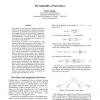Free Online Productivity Tools
i2Speak
i2Symbol
i2OCR
iTex2Img
iWeb2Print
iWeb2Shot
i2Type
iPdf2Split
iPdf2Merge
i2Bopomofo
i2Arabic
i2Style
i2Image
i2PDF
iLatex2Rtf
Sci2ools
111
click to vote
FLAIRS
2004
2004
The Optimality of Naive Bayes
Naive Bayes is one of the most efficient and effective inductive learning algorithms for machine learning and data mining. Its competitive performance in classification is surprising, because the conditional independence assumption on which it is based, is rarely true in realworld applications. An open question is: what is the true reason for the surprisingly good performance of naive Bayes in classification? In this paper, we propose a novel explanation on the superb classification performance of naive Bayes. We show that, essentially, the dependence distribution; i.e., how the local dependence of a node distributes in each class, evenly or unevenly, and how the local dependencies of all nodes work together, consistently (supporting a certain classification) or inconsistently (canceling each other out), plays a crucial role. Therefore, no matter how strong the dependences among attributes are, naive Bayes can still be optimal if the dependences distribute evenly in classes, or if the...
Artificial Intelligence | FLAIRS 2004 | Learning Algorithm | Naive Bayes | Naive Bayes Classification |
Related Content
| Added | 30 Oct 2010 |
| Updated | 30 Oct 2010 |
| Type | Conference |
| Year | 2004 |
| Where | FLAIRS |
| Authors | Harry Zhang |
Comments (0)

